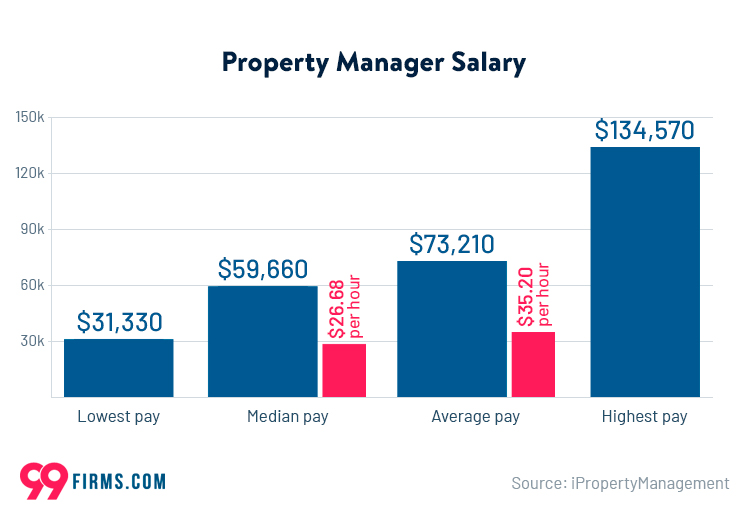Property manager pay is a complex and multifaceted topic, influenced by a wide range of factors. In this comprehensive guide, we will explore the various compensation structures, key factors influencing pay, industry benchmarks, regional variations, and performance-based incentives that shape the earning potential of property managers.
From base salaries and commissions to bonuses and incentives, we will provide a detailed overview of the different ways property managers are compensated. We will also discuss the impact of experience, education, location, and property type on pay, helping you understand the earning potential in this dynamic field.
Property Manager Pay

Property managers are responsible for the day-to-day operations of rental properties, including marketing, leasing, rent collection, and maintenance. Their compensation can vary depending on several factors, including the size and type of property being managed, their experience and education, and the location of the property.
Property Manager Compensation Structure
Property managers can be compensated in various ways, including:
- Base salary:A fixed amount paid regularly, regardless of the property’s performance.
- Commission:A percentage of the rent collected or a fee for each new lease signed.
- Bonuses:Performance-based incentives for exceeding occupancy rates or reducing operating expenses.
The compensation structure often depends on the size and type of property being managed. For example, managers of large apartment complexes may receive a base salary plus commission, while managers of smaller properties may be paid solely on commission.
Factors Influencing Property Manager Pay
Several factors can influence property manager pay, including:
- Experience:Property managers with more experience typically earn higher salaries.
- Education:A degree in real estate or a related field can increase earning potential.
- Location:Property managers in high-cost-of-living areas tend to earn more than those in lower-cost areas.
Industry Benchmarks and Salary Ranges
According to the National Apartment Association, the median salary for property managers in the United States is around $56,000 per year. However, salaries can vary significantly depending on the region and property type.
| Region | Median Salary |
|---|---|
| Northeast | $65,000 |
| Midwest | $58,000 |
| South | $52,000 |
| West | $62,000 |
- Property managers of large apartment complexes typically earn higher salaries than those managing smaller properties.
- Property managers with experience in commercial real estate tend to earn more than those in residential real estate.
Regional Variations in Compensation
Property manager pay can vary significantly depending on the region. For example, property managers in New York City typically earn higher salaries than those in smaller cities.
Property managers in New Orleans typically earn a competitive salary that reflects the city’s vibrant real estate market. However, it’s important to consider local factors such as real estate tax rates when evaluating compensation. By staying informed about these variables, property managers can ensure their salaries align with industry standards and the local economic landscape.
- In New York City, the median salary for property managers is around $80,000 per year.
- In Los Angeles, the median salary for property managers is around $70,000 per year.
- In Chicago, the median salary for property managers is around $60,000 per year.
Performance-Based Incentives
Property managers can earn additional compensation through performance-based incentives. These incentives may include:
- Bonuses for exceeding occupancy rates
- Bonuses for reducing operating expenses
- Commissions for new lease signings
Performance-based incentives can motivate property managers to improve the performance of the properties they manage.
Wrap-Up
Whether you are a property manager seeking to maximize your earning potential or a property owner seeking to understand the compensation structure of your property management team, this guide provides valuable insights and practical advice. By understanding the factors that influence property manager pay, you can make informed decisions and ensure fair and equitable compensation for the professionals responsible for managing your valuable assets.
Top FAQs
What are the typical compensation structures for property managers?
Property managers are typically compensated through a combination of base salary, commission, and bonuses. The specific structure may vary depending on the size and type of property being managed.
What factors influence property manager pay?
Key factors that influence property manager pay include experience, education, location, and the type of property being managed.
How do industry benchmarks compare to regional variations in property manager pay?
Industry benchmarks provide a general range for property manager salaries, but regional variations can significantly impact actual compensation. Factors such as cost of living, local market conditions, and the availability of qualified candidates can all influence pay rates.
What are common performance-based incentives for property managers?
Property managers can earn additional compensation through performance-based incentives, such as bonuses for exceeding occupancy rates, reducing operating expenses, or achieving specific financial targets.
